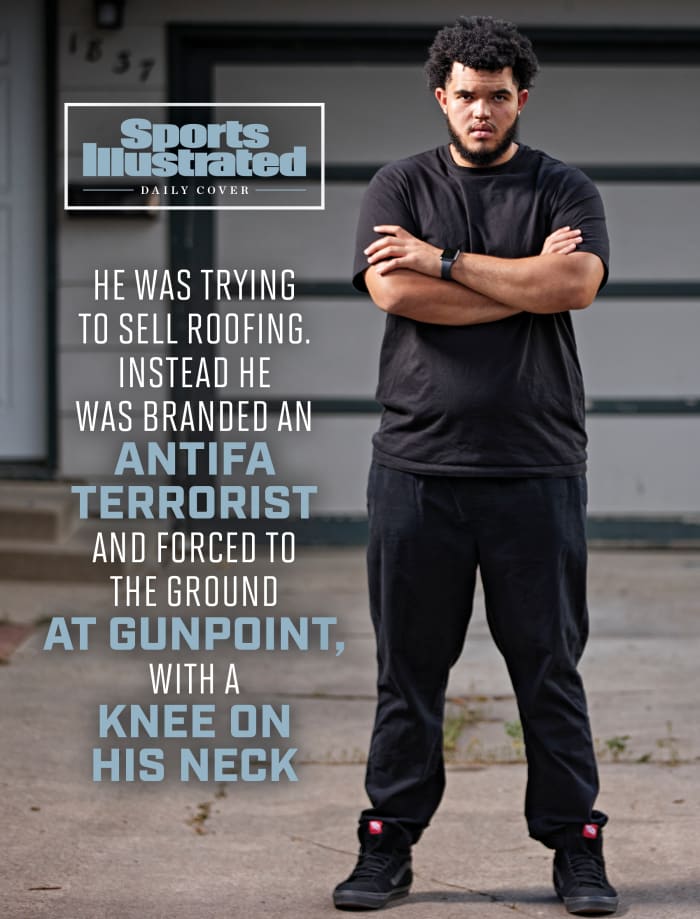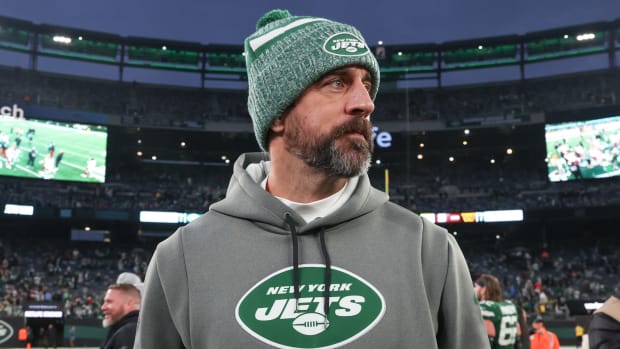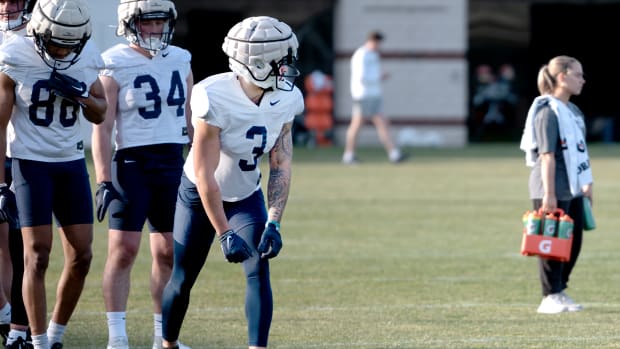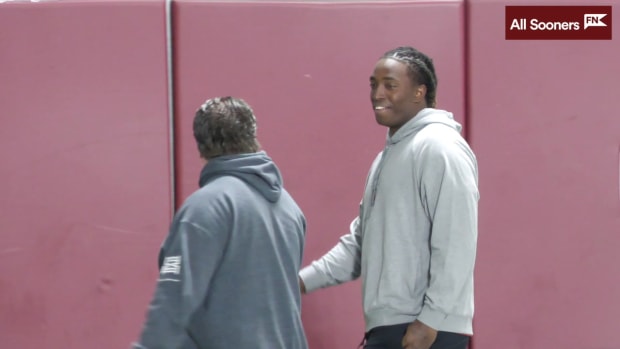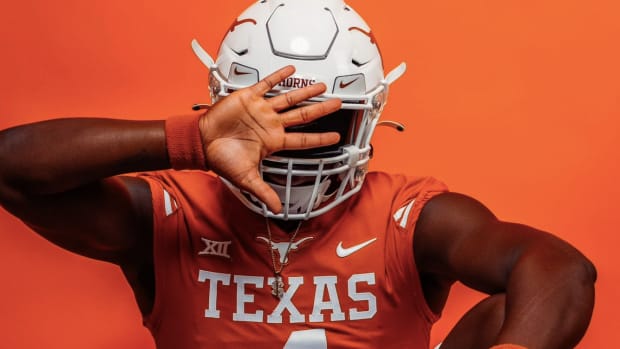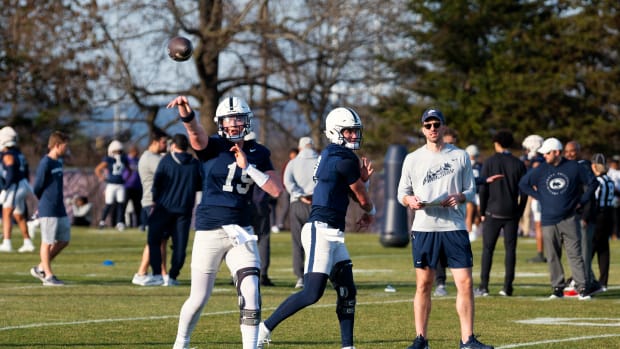Barry Wesley had told himself to be confident, but now he was starting to shake. His palms dampened with sweat. His heart kicked like a double bass drum. Later he would compare the moment to a terrified cliff diver standing on the edge of a 50-foot bluff, staring down at a blackened abyss, “and there’s no water in sight.”
In reality, the nervous 20-year-old was occupying an aisle seat behind the home sideline at sunny Canvas Stadium, where he has anchored Colorado State’s offensive line for the past two seasons. His teammates were there too, socially distanced across the stands, their looks of concern and confusion covered by medical face masks. Down in front, standing next to a few college administrators, coach Steve Addazio offered an introduction to this emergency, all-but-mandatory team meeting on June 12.
Halfway up the bleachers, his words penetrated Wesley’s fog in fragments:
… one of our teammates … involved in a situation … the climate of this country … Barry? Where are you sitting?
A weak hand went up, and Wesley slowly rose from his seat. He stepped into the aisle and trudged down the stairs, growing increasingly unsettled with each set of eyes that turned to him. At the front, where Addazio ceded the floor, Wesley—6' 6", 305 pounds—turned to face his teammates and steadied himself with a deep breath, counting: one … two … three. Then he spoke about what he calls “the most unforgettable day” of his life. Yesterday.
He talked about his new summer job as a door-to-door roofing salesman, and about an otherwise quiet afternoon of work in a nearby suburb. About the stranger in tactical gear who broke the silence by charging at Wesley and a colleague, screaming about “antifa” and terrorists, ordering the salesmen onto the ground. About the gun barrel the man jammed into the back of Wesley’s head, and the knee he pressed into the back of Wesley’s neck. About the seven or so minutes Wesley was pinned on the ground—hardly less time than a white Minneapolis police officer had spent atop another Black man, George Floyd, in a similar position, until Floyd died, just three weeks earlier.
Wesley stumbled more than once, choking back tears. Each time, though, he took another deep breath—one … two … three—and soldiered ahead. He described the thoughts that raced through his mind while he was on the ground. His parents and his girlfriend. His teammates and their football season. His 21st birthday, then a month away, and how badly he wanted to buy a legal drink.
“I don’t even know you yet,” he said at one point, addressing the incoming freshmen in the group, who were only just finishing their first day on campus, “but you’re family. I love every single one of you. I can’t wait to build our relationship.”
When he was finally finished, as silence hung over the stadium and the early-evening sun dipped below the Southern Rocky Mountains in the distance, Wesley collapsed back into a bleacher seat, dropped his head and sobbed. He thanked everyone for coming out on short notice, and for listening to the story he needed to share. Then he left them with a parting message, of which he hoped his fellow Black players in the stands would take special heed:
“Be safe,” Wesley said. “If you think it can’t happen to you, it definitely can.”
***
Aside from a brief stint at a Denver-area Walmart during his senior year of high school, all of Barry Wesley’s past work experiences had involved children. Not that any of it ever felt like work. He babysat nine of his 10 younger cousins. He supervised Little League baseball umpires. A few summers ago he interned at a Boys & Girls Club, which he loved so much that he decided right then to one day become a guidance counselor.
He was drawn by “the pureness, the naiveté” of children, he told the Rams’ website in May after receiving a campus-wide award for student leadership. “When you get older, you see the bad and the ugly and evil in people.”
The roofing job, though? It was just that—a job. He had wanted to start saving money heading into his redshirt junior year, so he followed a few teammates who already worked for Premier Roofing, taking a commission-based position as an intern-level sales associate.
On Wednesday, June 10, Wesley set out with a supervisor, 28-year-old Kyle Farrell, for his first day in the field, hoping to drum up some storm-damage-repair business in Loveland, an overwhelmingly white (nearly 85%) and middle-income (about $61,000 annually per household) community just south of campus. Wesley and Farrell wore standard company uniforms: khaki shorts, navy polo shirts and tennis shoes, plus surgical gloves and face masks on account of the pandemic. Farrell showed Wesley the ropes, offering tips on the sales script as they walked.
At one point in the morning, after a handful of stops with little to show for it, the two came upon a house with a white Jeep parked in the driveway and a NO SOLICITING sign on the door. Farrell knocked anyway, and an older man answered. Seeing the salesmen, Wesley recalls, 65-year-old Scott Gudmundsen—half a foot shorter than Wesley, with green eyes, auburn hair and a beard—flew into a rage. “He’s like, ‘What are you doing? Get off my property! Don’t you see the sign? Get the f--- off!’ So we leave.”
Across the street, Wesley and Farrell saw an elderly couple taking out the trash. But as they headed over to help, sensing an opportunity to marry altruism and capitalism, Gudmundsen bolted across his lawn, demanding to see identification. When Farrell replied that his ID was in his truck, Gudmundsen followed with his cellphone raised, filming the vehicle’s license plate, relenting only after inspecting Farrell’s solicitor’s badge and driver’s license.
Even as his tone turned friendly, Gudmundsen—wearing a hat with an American flag and identifying himself as a former police officer, Farrell says—conveyed the gravity of his concerns. “He goes on to explain how he thinks there have been ‘members of antifa, Mexican people in black-and-white cars, building pipe bombs and trying to terrorize the neighborhood,’ ” Wesley recalls.
At the time, Wesley says, he didn’t know anything about antifa—a broad term, short for anti-fascist, that encompasses an autonomous, leaderless protest movement committed to fighting far-right extremism. Based on Gudmundsen’s behavior, though, Wesley assumed that this perceived threat was serious, that “something must’ve happened” in the area to cause such alarm, he says. This idea was reinforced when Gudmundsen patted his hip, drawing attention to a handgun. Wesley, who says he’d never before encountered someone in public carrying a concealed weapon, was taken aback. “Like, this guy’s no joke. He’s really trying to protect the neighborhood.” (Colorado is a “shall-issue” concealed carry state, meaning police can issue permits for civilian firearms.)
Here the two sides parted ways. Gudmundsen returned to his house, Wesley recalls, hollering at the elderly couple across the street as if to validate his vigilance: “Don’t worry! They’re legit!” Wesley and Farrell, meanwhile, headed down the block to finish their day. They hit some 20 more homes before calling it quits. If the interaction with Gudmundsen had left any impression, it didn’t last long; that night Wesley was more focused on the contract that he and Farrell had scored to restore a roof damaged by hail.
“It was weird, but not really concerning,” Wesley says. “We talked about [Gudmundsen] on the way back to Fort Collins, about George Floyd and the climate of our country and how sensitive it is right now. I just figured: This guy’s been watching the wrong type of news channel or something.”
***
On June 11, Wesley awoke at the apartment of his girlfriend, Myanne Hamm, a recent CSU graduate and former basketball player. He attended a team workout and then reported to the Premier Roofing office in Fort Collins, eager to take the sales lead for his second day on the job, like he and Farrell had planned.
By the time he arrived, though, the plan had changed. Wesley recalls not being told much—just that Gudmundsen had phoned the roofing company that morning and spoken to a supervisor; and that, as a result, he and Farrell were to avoid Gudmundsen’s street. (He says he wasn’t informed until later, however, that on the call Gudmundsen had again accused the salesmen of being “antifa,” citing the way they were dressed—particularly their face masks. Nor was he informed that the call ended when Gudmundsen began acting “erratically” and “yell[ing] violently,” as the supervisor would later tell police.)
Wesley again shrugged off any concern. “I didn’t think too much of it,” he says. So he and Farrell sat outside their office, practicing their script. Then they drove to Loveland, where Wesley used football as an icebreaker, ingratiating himself with a homeowner who had a Denver Broncos tailgate van parked in the driveway, earning an invitation to inspect the man’s roof.
The afternoon plodded along. The salesmen rang some more bells, knocked on some more doors, but no one answered. Nearing the end of one street, they turned right, away from Gudmundsen’s home, into a cul-de-sac, and tried several more houses, to no avail. At that point, Wesley says, he stopped in a driveway to log their efforts on a clipboard. Farrell was nearby, standing closer to the road, when Wesley spotted a man coming their way, “dressed in full body armor, all camouflage, with a reflective optic sight on his gun.”
Scott Gudmundsen was toting a veritable arsenal as he rushed in screaming, “Police! Get on the f------ ground or I’ll kill you!” Among his gear, which all together weighed upward of 35 pounds: two loaded Glock 17 pistols, one installed with a micro RONI stabilizer, such that it resembled a rifle; two 33-round Glock 9mm magazines, containing 50 total rounds of ammo; an armored plate carrier; four 30-round rifle magazines; and two knives.
Eyeing the gun in Gudmundsen’s grip, Wesley says he dropped to the pavement and locked his hands above his head. Farrell initially tried to defuse the situation, pleading with Gudmundsen to remember their interaction from the previous day. But it was no use. “Shut up!” Wesley says Gudmundsen yelled, repeating his orders: “Get on the ground!”
As Wesley remembers it: Gudmundsen marched up the driveway, “right over Kyle,” who was now splayed out, “and goes straight to me.” Again, Gudmundsen accused the salesmen of being antifa, which he said negated their civil rights. Face down, Wesley couldn’t see what was happening, but he felt Gudmundsen grab his ankles, attempting to restrain them. “I’m too big,” he says, “so it didn’t work.”
Instead, Wesley says Gudmundsen knelt on the back of his neck, jamming the rifle-like gun against the offensive lineman’s skull. Fearing that Gudmundsen would pull the trigger at the slightest movement, Wesley tightened his fingers until his arms throbbed with pain. He bawled and begged:
“Please don’t kill me. … Please don’t kill me.”
Gudmundsen’s reply still haunts him.
“You’re lucky,” Wesley remembers hearing from above. “I’m not going to kill you. The police are going to do that for me.”
***
“At that point,” Wesley says, “I was in my own head.” Visions raced by, of a life and a future on fast-forward: his mother and stepfather, who never missed one of his football, basketball or baseball games. The cousins he used to babysit, the youngest just about to enter high school. His home in Bear Creek, Colo., and a childhood full of pool parties, barbecues and backyard Wiffle ball tournaments.
He saw Hamm and the apartment they planned to move into together. He pictured his best friends at CSU—the teammates who’d encouraged him as he busted ass to earn a scholarship as a walk-on in August 2018, and who competed alongside him when he started all 24 games over the next two seasons, appearing at all five line positions. He wondered whether he would ever play another snap.
He thought about the taste of chocolate, a favorite indulgence. He thought about the tree he’d been staring at from the moment he hit the ground—thick and dark in the trunk, with bright green leaves. It was a young tree, Wesley concluded, far from finished growing.
He thought about his 21st birthday, a month away, and about all of the adult experiences he wouldn’t get to enjoy: buying a house, owning a dog, getting married, having kids …
Sirens snapped him back to reality.
A fleet of Loveland police officers had rushed to the cul-de-sac, cued by a burst of 9-1-1 calls, the first of which had come from Gudmundsen. Again identifying himself as a former police officer, and reporting that he planned to confront “members of antifa … in the neighborhood wearing masks,” Gudmundsen had finished that dispatch by promising he would drop to the ground when authorities arrived, to show he was not a threat. A responding officer’s report described what followed:
Gudmundsen was reaching around, pulling gear off himself and throwing it to the side. I told him to stop moving. Gudmundsen continued reaching around saying … he was a former SWAT police officer. I continued giving him instructions to stop moving. Eventually Gudmundsen stopped moving and stuck his arms out to his side. ... The other two males lying in the driveway … were wearing similar polo shirts and shorts. There was a ladder and clipboards lying next to them.
Shortly after 6 p.m., Gudmundsen was arrested on two counts each of felony menacing and false imprisonment. Two charges of illegal firearm use and one charge of impersonating a police officer were eventually added.
As a squad car hauled the assailant away in cuffs, Wesley remained face-down in the driveway, equally shocked and relieved. After an officer helped him up, he started pacing around, taking deep breaths—one … two … three … —with his fingers still interlaced above his head, as Gudmundsen had ordered. An officer told him he was free to lower his hands, but Wesley kept them up. It felt refreshingly familiar, as though he were back at training camp, trying to catch his breath in the aftermath of a tough drill.
Not that it soothed him any. His hand shivered as he scrawled a police statement, reliving every detail in “the worst handwriting I’ve ever had,” he says—“like a kindergartner.” His voice shook as he spoke to a victim’s advocate on the phone. Later he drove to Hamm’s apartment, collapsing into her arms at the door and crying for minutes on end before, as she recalls, he finally began explaining why: “I almost died. The guy from yesterday, he hunted us down.”
Wesley stayed up late, calling and texting people in his support network to talk through what had happened—his and Hamm’s parents, some CSU administrators and players, even his favorite youth football coach—and woke up the next morning feeling like he’d had a “a bad dream.” He went to team workouts, hoping for some normalcy, but his mind was fixed on the driveway. On the gun. On the tree. “We were doing some sort of jumping drill,” he remembers, and “I felt like I was floating. My feet would leave the ground, but I never really felt like they came back.”
A few players knew what had happened, but it wasn’t their place to spread the word, which is why Wesley accepted Addazio’s invitation for a team meeting. And so it was that he came to bare his soul in a football stadium, in front of coaches and trainers and wide-eyed freshmen he’d barely met. At the end, a long line of players formed to hug him, tears soaking their face coverings.
Among those players: senior running back Marcus McElroy. To McElroy, Wesley was the tender soul who would rush to rescue him from a pile-up during games, screaming, “Get off my roommate!” He was the helpful spirit who thought nothing of stepping into the January freeze to help a neighbor whose car needed a late-night jump. The dedicated leader who mentored freshmen athletes, who visited elementary schools near campus and read to kids.
“Barry was meant to be here for something,” McElroy says. “Just the fact that this happened …” He pauses, searching for an explanation but coming up empty.
“Out of all people, why him?”
***
Right after the team meeting, Wesley decamped with his parents and Hamm to her family’s property in the foothills of Livermore, just outside of Fort Collins. Situated on 40 acres of former diamond mines, grazed by cattle, alpaca, chickens and sheep, the remote setting was intended to be a peaceful distraction. But Wesley was stuck on questions that had bugged him since the incident. Not Why him?, as his teammate had wondered. Rather: Who was Scott Gudmundsen? And why had he attacked me?
Some of those answers Wesley found on Gudmundsen’s since-deleted Facebook page, where his bio section declared “Family Man, Christian, Zero Tolerance for Evil” below a picture of him dressed in camouflage, aiming a rifle. There Gudmundsen had posted videos documenting his involvement with a Utah-based shooting club, Soldiers of Valhalla. In one series, Gudmundsen, referring to himself as “Instructor Scott,” demonstrates how to spray-paint tactical equipment, such as a gun belt, and occasionally brandishes a hand grenade—all while sporting a T-shirt with a logo containing a valknot, an old Norse symbol that the Anti-Defamation League reports has been embraced by white supremacists.
Other details were buried in the vault of public records, not easily available to Wesley as he dug deeper that weekend. A graduate of Foothill High in Santa Ana, Calif., Gudmundsen attended BYU, completing a two-year Mormon mission to Ireland in the 1970s. Later he worked for police departments in Vernal City, Uintah County and Naples City, all in Utah, before retiring in the late ’90s on disability, according to one of his four children, Stan.
Over the years, Stan says, his father developed a fascination with internet conspiracy theories, which grew increasingly “fanatical” in the months leading up to June 11. That fanaticism covered “a broad range of subjects,” says Stan, 36, from the antifa bogeyman that President Donald Trump invoked this summer to rally far-right supporters as racial justice protests raged around the country, to the idea that the COVID-19 pandemic was fake. At one point, Stan grew alarmed enough that he suggested his father see a doctor, but he says Scott “just laughed it off.” (After his arrest, Scott Gudmundsen spent more than a month at a mental health and substance abuse center, where he was prescribed medication for mental illness, according to court statements from his public defender.)
But Stan insists there isn’t anything “secretive or racist” about the Soldiers of Valhalla gun club, “just a group of guys that go out and shoot together.” And he says the Facebook videos “portray my dad in the worst light possible—that’s just him trying to entertain.” When asked if he has a message for Wesley and Farrell, Stan replies, “We as a family feel horrible that this happened, and we wish them healing from a senseless, stupid act. We just want people to know that [my dad] didn’t go after them because of race.”
Wesley, understandably, sees the darkness of the incident in a different light. He thinks about Gudmundsen stepping over Farrell, who is white, in the driveway and heading toward him instead. He thinks about a conversation later that night, with the roofing supervisor who had fielded Gudmundsen’s angry call to the office, in which he says the supervisor told him, “Scott said, ‘I don’t want any members of antifa, or Mexicans, or big Black guys in my neighborhood.’ ” (According to the police report, the supervisor “never mentioned [Gudmundsen] making any racial comments. … Rather, he accused the salesmen of being antifa based on the way they were dressed.”)
Wesley is no stranger to racism. During his short time at CSU, where he is part of a small community of Black students—less than 3% of the student body—the campus has seen four white students wearing blackface, a noose hanging in a residence hall staffed by a Black RA, and the N-word written in a campus restroom. None of these events involved him personally, but casual microaggressions have long been a constant in his life. The grocery clerk who checks Wesley’s receipts to ensure he isn’t stealing. The woman in the elevator, tightening her grip on her purse. “Walking into any room and people are staring at you,” he says, “I’ve gotten used to it. You see all the eyes sizing you up as if you’re a threat to them.”
After police killed George Floyd on May 25, Wesley waited a few days before bringing himself to watch the video. “The first time, I was completely saddened,” he says. “The second time, I was looking at the police officer’s facial expressions. That really made me upset.” As a national reckoning over racial injustice ignited, Wesley sought out conversations with his white friends. One in particular said he didn’t understand why people were “causing riots,” which Wesley saw as an educational opportunity.
“There’s a lot of people in this country that don’t understand what Black people are going through, and why they’re reacting in a certain way,” Wesley says. “It was important for me to explain to him why the Black community felt this way. We’re tired of being oppressed … of being not even a citizen and having to fear for your life on a daily basis.”
When Wesley thinks today about what might have led Gudmundsen to grab his guns and knives and body armor, and terrorize two roofing salesmen, he doesn’t hesitate. “The climate of our country, it was perfect timing,” he says. “I think he was watching the news, and the news was showing him what he wanted to see—and that led to his actions. I think he was scared and frightened and he needed to do [what he thought was] the right thing. He took advantage of his knowledge of how to use a firearm to take someone’s right to humanity.
“He definitely defeated my sense of peace and stability.”
***
In the days after the incident, Wesley faded into a shell of himself. He constantly recalled how he’d felt lying on the ground, a hulking protector of quarterbacks rendered “helpless and defenseless.” He started losing his temper over little things, snapping at Hamm when she was just trying to make him laugh. One night, he spotted a Jeep driving by the house and found himself convinced that Gudmundsen had sent someone to spy on him.
“I’m not the same person I used to be,” he told his therapist through tears.
More than two months later, Wesley is still learning to cope with the triggers. He will see a tree that resembles the one he focused on in the cul-de-sac. Or drive past a street and remark to Hamm, “This is the way to Scott’s house.” Not long ago, the couple was strolling through a park when they struck up a conversation with a stranger. As they parted ways, Wesley glanced over his shoulder and saw the man walking behind them. “My initial reaction was: This man has a weapon,” Wesley says. “It turns out he was just getting something from his car. I want to go back to [being] that person where I didn’t think of the worst possible scenario.”
Healing will no doubt take time and patience. But Wesley is resolute. “Just because this happened to me,” he says, “I’m not going to let this define who I am.” As he works toward that goal, though, he has learned to lean on others for strength, such as his teammates at CSU, who organized a solidarity march shortly after the incident, seeking Wesley’s final approval for all of the key details, from the suggested attire (plain black shirts) to the route (through downtown Fort Collins). “It was perfect,” Wesley says. “I’m really proud and thankful for them.”
He has also learned the value of being vulnerable about his trauma, “instead of having it all bottled up inside,” he says. He started sharing more details with the members of his support network—his family, his therapist, Hamm—and soon felt the anger "floating away.” That’s why he’s publicly disclosing his identity as a victim for the first time. “To tell my story,” he says. “To recognize that what happened to me happens all across the country—to Black people, to minorities—and a lot of those situations end up with the victim dying. That’s very special to me, knowing that I did come home.”
Closure on the legal side will take longer. For now Gudmundsen is being held on $50,000 bond, having twice been denied appeals to lower that fee. Wesley, meanwhile, retained a lawyer to help him navigate the criminal justice system as a victim, and he continues to watch Gudmundsen’s court hearings on Zoom.
He says he was interviewed by FBI agents the week after the incident, which he is hopeful will lead to hate crime charges, but he hasn’t heard anything since. (The U.S. District Attorney of Colorado and the FBI declined to comment.) “I want to see him put in jail,” Wesley says, “and used as an example of what not to do.”
Despite the upheaval that a pandemic has wrought across college football, Wesley’s life has slowly returned to normal in other meaningful ways. He finished a remote summer course for his major—Psychology 456: Sensation and Perception—and is weighing CSU grad programs for fall 2021. He and Hamm finally moved into their new apartment, where Wesley lost the battle over the second bedroom. He wanted a video game station; instead it became her office.
Then there was his birthday, on July 14, although technically the celebration spanned two full weekends. Wesley bought his first legal drink over dinner with his parents, a fruity rum cocktail called a Fort Collins Sunset. He used his license at the liquor store and threw a party with his teammates, emerging with a nasty, welcome-to-adulthood hangover. He ate chicken wings grilled by his stepdad and treated himself to a bar of chocolate.
With the Mountain West Conference indefinitely postponing fall sports due to COVID-19, though, Wesley’s immediate future has been clouded by uncertainty. “I just have to find structure and stability, or I’ll go crazy,” he says. “That’s what football was: structure and stability.”
He will not be returning to roofing sales, that much is certain, but he hasn’t ruled out the possibility of finding another job.
“I was thinking babysitting,” he says. “Something of that nature.”
